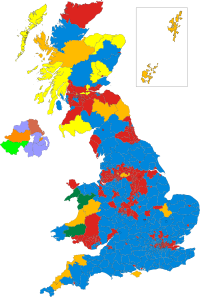
Back যুক্তরাজ্যের সাধারণ নির্বাচন, অক্টোবর ১৯৭৪ Bengali/Bangla Eleccions al Parlament del Regne Unit d'octubre de 1974 Catalan Etholiad cyffredinol y Deyrnas Unedig, Hydref 1974 Welsh Britische Unterhauswahl Oktober 1974 German Elecciones generales del Reino Unido de octubre de 1974 Spanish Yhdistyneen kuningaskunnan parlamenttivaalit 1974 (lokakuu) Finnish Élections générales britanniques d'octobre 1974 French הבחירות הכלליות בבריטניה 1974 (אוקטובר) HE Pemilihan umum Britania Raya Oktober 1974 ID Elezioni generali nel Regno Unito dell'ottobre 1974 Italian
| |||||||||||||||||||||||||||||||||||||||||||||||||
All 635 seats in the House of Commons 318 seats needed for a majority | |||||||||||||||||||||||||||||||||||||||||||||||||
|---|---|---|---|---|---|---|---|---|---|---|---|---|---|---|---|---|---|---|---|---|---|---|---|---|---|---|---|---|---|---|---|---|---|---|---|---|---|---|---|---|---|---|---|---|---|---|---|---|---|
| Opinion polls | |||||||||||||||||||||||||||||||||||||||||||||||||
| Turnout | 72.8% ( | ||||||||||||||||||||||||||||||||||||||||||||||||
| |||||||||||||||||||||||||||||||||||||||||||||||||
 Colours denote the winning party—as shown in § Results | |||||||||||||||||||||||||||||||||||||||||||||||||
 Composition of the House of Commons after the election | |||||||||||||||||||||||||||||||||||||||||||||||||
| |||||||||||||||||||||||||||||||||||||||||||||||||
The October 1974 United Kingdom general election took place on Thursday 10 October 1974 to elect 635 members of the House of Commons. It was the second general election held that year; the first year that two general elections were held in the same year since 1910; and the first time that two general elections were held less than a year apart from each other since the 1923 and 1924 elections, which took place 10 months apart.
The election resulted in a narrow victory for the Labour Party, led by Prime Minister Harold Wilson, which won a wafer-thin majority of 3 seats, the narrowest in modern British history. It was to remain the last general election victory for the Labour Party until 1997, with the Conservative Party winning majorities in the next four general elections. It would also be the last time Labour won more seats at a national election than the Conservatives until the 1989 European Parliament election. This remains the most recent General Election that Labour made net gains in seats whilst in government.
The narrowness of the majority meant that the Labour government saw a gradual loss of its majority by 1977 through a series of by-election losses and defections, thus requiring deals with the Liberals, the Ulster Unionists, the Scottish Nationalists and the Welsh Nationalists. It led to the eventual defeat of the government in a no-confidence motion in March 1979, six months before the mandatory dissolution of Parliament was set to take place.
This election was held just seven months after the previous general election, held in February 1974, had led to a hung parliament, with Labour winning 301 seats and the Conservatives left with 297. Following the inconclusive nature of coalition talks between the Conservatives and other parties such as the Liberals and the Ulster Unionists, the Labour Leader Harold Wilson went on to form a minority government.
The October campaign was not as vigorous or exciting as the one in February. Despite continuing high inflation, Labour boasted that it had ended the miners' strike, which had dogged Heath's premiership, and had returned some stability. The Conservative Party, led by Leader of the Opposition and former Prime Minister Edward Heath, released a manifesto promoting national unity, but its chances of forming a government were hindered by the Ulster Unionist Party refusing to take the Conservative whip at Westminster in response to the Sunningdale Agreement of 1973.
Both the Conservatives and the Liberals saw their vote share decline, and Heath, who had lost three of the four elections that he contested, was ousted as Conservative leader in February 1975 and replaced with future Prime Minister Margaret Thatcher. The Scottish National Party won 30% of the Scottish popular vote and 11 of Scotland's 71 seats in the party's most successful general election result until 2015.
The election was broadcast live on the BBC and was presented by David Butler, Alastair Burnet, Robert McKenzie, Robin Day and Sue Lawley.[1]
Since Jeremy Thorpe's death in December 2014, this is the latest election where all the three major party leaders are deceased.
Cite error: There are <ref group=note> tags on this page, but the references will not show without a {{reflist|group=note}} template (see the help page).

